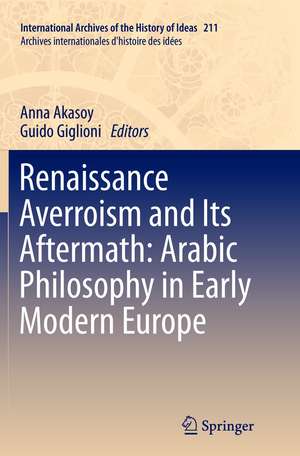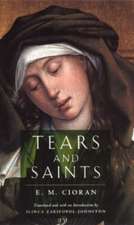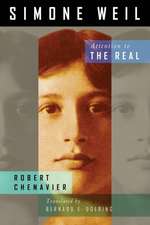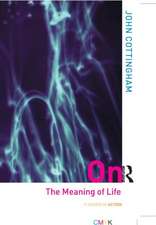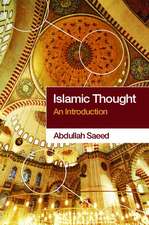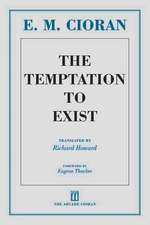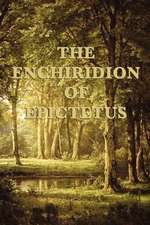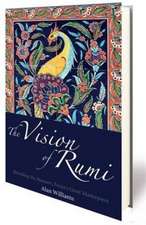Renaissance Averroism and Its Aftermath: Arabic Philosophy in Early Modern Europe: International Archives of the History of Ideas Archives internationales d'histoire des idées, cartea 211
Editat de Anna Akasoy, Guido Giglionien Limba Engleză Paperback – 29 ian 2015
Toate formatele și edițiile
| Toate formatele și edițiile | Preț | Express |
|---|---|---|
| Paperback (1) | 570.73 lei 38-45 zile | |
| SPRINGER NETHERLANDS – 29 ian 2015 | 570.73 lei 38-45 zile | |
| Hardback (1) | 581.65 lei 38-45 zile | |
| SPRINGER NETHERLANDS – 13 dec 2012 | 581.65 lei 38-45 zile |
Din seria International Archives of the History of Ideas Archives internationales d'histoire des idées
- 24%
 Preț: 679.97 lei
Preț: 679.97 lei - 18%
 Preț: 728.43 lei
Preț: 728.43 lei -
 Preț: 380.25 lei
Preț: 380.25 lei -
 Preț: 382.18 lei
Preț: 382.18 lei -
 Preț: 382.36 lei
Preț: 382.36 lei -
 Preț: 385.84 lei
Preț: 385.84 lei -
 Preț: 381.43 lei
Preț: 381.43 lei -
 Preț: 380.45 lei
Preț: 380.45 lei - 18%
 Preț: 1218.35 lei
Preț: 1218.35 lei -
 Preț: 379.68 lei
Preț: 379.68 lei -
 Preț: 399.29 lei
Preț: 399.29 lei - 18%
 Preț: 950.03 lei
Preț: 950.03 lei -
 Preț: 385.08 lei
Preț: 385.08 lei - 18%
 Preț: 953.20 lei
Preț: 953.20 lei - 15%
 Preț: 648.24 lei
Preț: 648.24 lei - 15%
 Preț: 641.03 lei
Preț: 641.03 lei - 18%
 Preț: 954.93 lei
Preț: 954.93 lei - 18%
 Preț: 944.19 lei
Preț: 944.19 lei - 15%
 Preț: 643.00 lei
Preț: 643.00 lei - 18%
 Preț: 1825.40 lei
Preț: 1825.40 lei - 18%
 Preț: 1224.54 lei
Preț: 1224.54 lei - 15%
 Preț: 644.63 lei
Preț: 644.63 lei - 15%
 Preț: 633.53 lei
Preț: 633.53 lei - 15%
 Preț: 647.08 lei
Preț: 647.08 lei - 18%
 Preț: 1233.06 lei
Preț: 1233.06 lei -
 Preț: 390.25 lei
Preț: 390.25 lei - 18%
 Preț: 945.92 lei
Preț: 945.92 lei - 18%
 Preț: 951.91 lei
Preț: 951.91 lei - 18%
 Preț: 1219.63 lei
Preț: 1219.63 lei - 15%
 Preț: 638.24 lei
Preț: 638.24 lei - 18%
 Preț: 1223.43 lei
Preț: 1223.43 lei
Preț: 570.73 lei
Preț vechi: 713.41 lei
-20% Nou
Puncte Express: 856
Preț estimativ în valută:
109.21€ • 119.11$ • 92.09£
109.21€ • 119.11$ • 92.09£
Carte tipărită la comandă
Livrare economică 21-28 aprilie
Preluare comenzi: 021 569.72.76
Specificații
ISBN-13: 9789401781022
ISBN-10: 9401781028
Pagini: 416
Ilustrații: VIII, 408 p.
Dimensiuni: 155 x 235 x 22 mm
Greutate: 0.58 kg
Ediția:2013
Editura: SPRINGER NETHERLANDS
Colecția Springer
Seria International Archives of the History of Ideas Archives internationales d'histoire des idées
Locul publicării:Dordrecht, Netherlands
ISBN-10: 9401781028
Pagini: 416
Ilustrații: VIII, 408 p.
Dimensiuni: 155 x 235 x 22 mm
Greutate: 0.58 kg
Ediția:2013
Editura: SPRINGER NETHERLANDS
Colecția Springer
Seria International Archives of the History of Ideas Archives internationales d'histoire des idées
Locul publicării:Dordrecht, Netherlands
Public țintă
ResearchCuprins
Preface.- Introduction, A. Akasoy and G. Giglioni.- Middle Ages and Renaissance.- Averroes’ Criticisms of Avicenna’s Philosophy in Latin Philosophy and Historiograph, A.Bertolacci.- The Giuntine Aristotle-Averroes Edition (1550-1552) Revisited, C. Burnett.- Super-Commentaries: The Renaissance Resurgence of Commentaries on Averroes, C. Martin.- Marsilio Ficino, the Platonic Mind and the Monster of Averroes, M. J.B. Allen.- The ‘Transmutations’ of a Young Averroist: The Account of Celestial Influences in Agostino Nifo’s Commentary on Averroes’ Destructio destructionum, N. Holland.- Intellectual Beatitude in the Averroist Tradition: The Case of Agostino Nifo, L. Spruit.- Averroistic Themes in Girolamo Cardano’s De immortalitate animorum, J.M.G. Valverde.- Phantasms of Reason and Shadows of Matter: Averroes’s Notion of the Imagination and Its Renaissance Interpreters, G. Giglioni.- The early modern period.- Cambridge Platonists and Averroism, S. Hutton.- Reconsidering the Case of Elijah Delmedigo’s Averroism and its Impact on Spinoza, C. Fraenkel.- Averroes and Arabic Philosophy in the Modern Historia philosophica (17th-18th Centuries), G. Piaia.- Immanuel Kant, Universal Understanding, and the Meaning of Averroism in the German Enlightenment, M. Sgarbi.- Averroism and modernity.- Latin Averroism: From Myth to History to Fiction, J. Marenbon.- Leo Strauss and the Alethiometer, J. Montgomery.- Was Ibn Rushd an Averroist? The Problem, the Debate and its Philosophical Implications, A. Akasoy.
Recenzii
“This collection of essays brings us a wonderfully rich and multifaceted view that does justice to the elusive character of Averroes’s figure and to the extent to which it has shaped Western culture. … The high quality of all these essays is evident and the book will be of profit to many scholars with different interests.” (Lucian Petrescu, Journal for Early Modern Studies, Vol. 5 (1), 2016)
Notă biografică
Anna Akasoy, PhD in Oriental Studies (2005) at the University of Frankfurt, specializes in the history of Islamic intellectual history and contacts between the Islamic world and other cultures. In 2005, she joined the Warburg Institute as a research assistant. In 2008, she joined the University of Oxford as a departmental lecturer in Islamic history and thought and remained as British Academy postdoctoral fellow at the Oriental Institute. In 2012, she is a visiting research fellow at the Käte Hamburger Kolleg ‘Dynamics in the History of Religions’ at the Ruhr University (Bochum, Germany). Guido Giglioni is the Cassamarca Lecturer in Neo-Latin Cultural and Intellectual History at the Warburg Institute, School of Advanced Study, University of London. He obtained his PhD in History of Science and Medicine at the Johns Hopkins University, Baltimore (2002). He then received a post-doctoral Research Fellowship at the Dibner Institute, MIT, Boston. He has published a book on Jan Baptiste vanHelmont (Immaginazione e malattia, Milan 2000), one on Francis Bacon (Francesco Bacone, Rome 2011), and edited a volume of manuscript papers of Francis Glisson (Cambridge 1996). He has written essays on Renaissance philosophy and medicine. He is currently working on Francis Bacon’s philosophy (ERC Starting Grant ‘Francis Bacon and the Medicine of the Mind’).
Textul de pe ultima copertă
While the transmission of Greek philosophy and science via the Muslim world to western Europe in the Middle Ages has been closely scrutinized, the fate of the Arabic philosophical and scientific legacy in later centuries has received less attention, a fault this volume aims to correct. The authors in this collection discuss in particular the radical ideas associated with Averroism that are attributed to the Aristotle commentator Ibn Rushd (1126-1198) and challenge key doctrines of the Abrahamic religions.
This volume examines what happened to Averroes’s philosophy during the sixteenth, seventeenth and eighteenth centuries. Did early modern thinkers really no longer pay any attention to the Commentator? Were there undercurrents of Averroism after the sixteenth century? How did Western authors in this period contextualise Averroes and Arabic philosophy within their own cultural heritage? How different was the Averroes they created as a philosopher in a European tradition from Ibn Rushd, the theologian, jurist and philosopher of the Islamic tradition?
This volume examines what happened to Averroes’s philosophy during the sixteenth, seventeenth and eighteenth centuries. Did early modern thinkers really no longer pay any attention to the Commentator? Were there undercurrents of Averroism after the sixteenth century? How did Western authors in this period contextualise Averroes and Arabic philosophy within their own cultural heritage? How different was the Averroes they created as a philosopher in a European tradition from Ibn Rushd, the theologian, jurist and philosopher of the Islamic tradition?
Caracteristici
Up to date account on the reception of Arabic philosophy in early modern Europe, covering the Renaissance to the rise of Oriental studies In depth study of how Western authors contextualized Averroes and Arabic philosophy within their own cultural heritage during the 16th, 17th and 18th centuries Provides important discussions on the differences between Averroes, the philosopher, as created by the European tradition, and Ibn Rushd, the theologian, jurist and philosopher of the Islamic tradition Includes supplementary material: sn.pub/extras
